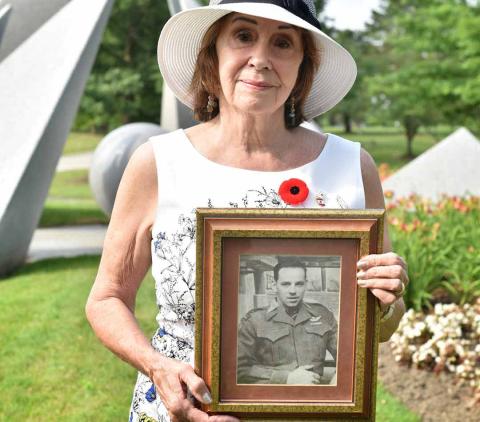
Billy Regan enlisted in the Royal Canadian Regiment in 1950, when he was only 16. He went on to train at Camp Borden and CFB Petawawa before being deployed, as part of the United Nations multinational force to defend South Korea from invasion.
“I know that my father, who was a World War Two Veteran and had only been home from overseas for four years, was not too happy about him signing up,” Hazel says ”because he knew what war was like, and he was his only son.”
Ten days before the Korean War Armistice Agreement was to be signed, Billy Regan was wounded by enemy mortar fire. Sadly, he died of his injuries on 17 July 1953, after being airlifted to a nearby military hospital. He was among the last Canadians to be killed in the Korean War. It was the day after Hazel turned seven years old.
“My mom couldn’t bear to stay in the home where she had raised her son that had died.”
She remembers her father realizing there was bad news as the telegraph boy rode up their street, and later on, her parents seated on their front porch, as a parade of people came by to give their condolences. After Billy was killed, her family moved out of the house they had spent their life in.
“My mom couldn’t bear to stay in the home where she had raised her son that had died,” Hazel says.
Hazel has travelled twice to the Republic of Korea to visit the gravesite of her brother. In 1991, she and four of her sisters visited as part of a program, offered by the Royal Canadian Legion in partnership with the Government of the Republic of Korea, for Korean War Veterans and the surviving family members of those who were killed in action, to see what their sacrifices had helped Korea become.
“It was really something to have the sisters there, honouring our brother,” she says.
At the United Nations Memorial Cemetery in Busan, where Billy Regan is buried, the sisters arranged for a bagpiper and minister to be at the gravesite to give their brother the funeral they had never been able to give him.
She also returned to visit her brother in 2011, this time with her great-nephew.
“Korea is often called the forgotten war, people don’t seem to realize that 516 Canadians were killed.”
Hazel dutifully attends the annual service of remembrance hosted by the Korea Veterans Association (Ontario Region) in Brampton, ON to mark the end of the Korean War on July 27. The ceremony is hosted at the Meadowvale Cemetery where the Korea Veterans Association of Canada’s Wall of Remembrance is located. Hazel and her sisters actually bought a symbolic brick in the wall in honour of their brother. The Wall of Remembrance at Meadowvale Cemetery was dedicated in 1997 and commemorative ceremonies are held there on the anniversary of the Korean Armistice Agreement, which was signed on 27 July 1953.
“From the first year that it opened up at Meadowvale we’ve been there,” Hazel says “Though the number of sisters has dwindled.”
Hazel says the creation of this Wall of Remembrance, to honour her brother and other Canadians like him, was extremely important to her.
“It’s strange to be happy about a sad event, but my sisters and I were very happy to have the wall built to recognize and honour the Canadians who served in Korea,” Hazel says “Korea is often called the forgotten war, people don’t seem to realize that 516 Canadians were killed.”
“It’s vitally important we remember the people who have preserved peace and freedom,” she says.
As we remember the Canadians who served in the Korean War and recognize those who lost loved ones in the defence of peace and freedom, Hazel Regan is this week’s Face of Freedom.